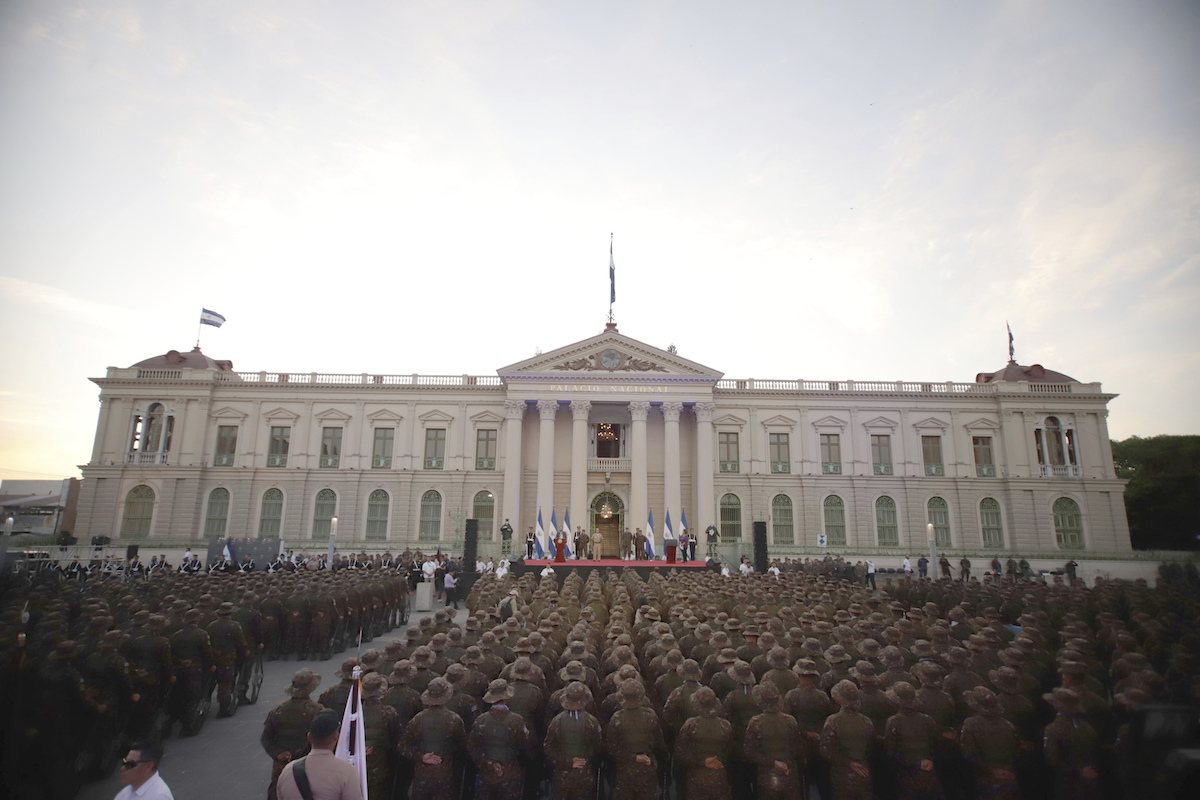

El Salvador’s President Nayib Bukele delivers his speech to the newly inducted members of the armed forces at Gerardo Barrios square in front of the National Palace in San Salvador, El Salvador, Tuesday, February 18, 2020. (AP Photo/Salvador Melendez)
By JOSHUA GOODMAN, Associated Press
MIAMI (AP) — A senior U.S. official quietly told El Salvador’s government that anti-poverty assistance from Washington is at risk over President Nayib Bukele’s defiance of his country’s supreme court and congress, The Associated Press has learned.
The rare rebuke from the Trump administration —one of Bukele’s biggest boosters— came in a May 29 letter to an aide of the president from Thomas Kelly, acting vice president of the Millennium Challenge Corporation, an independent U.S. foreign aid agency that has committed nearly $300 million in grants to the small Central American country.
With Congress considering whether to extend a September 9 deadline for spending the U.S. aid, the criticism reflects growing concerns among mainly Democratic lawmakers that Bukele is taking his country down an authoritarian path, such as his use of troops to intimidate legislators and his rejection of high court ruling against tough pandemic restrictions.
“Recent actions by the Government of El Salvador have raised questions about the government’s commitment to MCC’s eligibility criteria, in particular the Executive Branch’s interactions with the other branches of government,” Kelly’s letter said. “Further concerning incidents relating to these criteria could risk negative consequences for our partnership, something we wish to avoid.”
Kelly added that assistance from the MCC is contingent on “strict adherence to the rule of law and the protection of fundamental freedoms.”
A copy of the letter was provided to AP by a U.S. congressional staffer on the condition of anonymity to disclose a private correspondence.
Bukele’s press office did not comment in response to a list of questions about the letter.
The MCC in 2014 signed a compact with El Salvador to provide up to $277 million to finance regulatory reforms, education and infrastructure improvements, with the goal of promoting economic growth and private investment in the country. El Salvador agreed to allocate an additional $88 million for those efforts. It is one of the MCC’s largest commitments anywhere in the world and followed an earlier $461 million U.S. aid package.
It’s not clear how El Salvador addressed Kelly’s private concerns, but there’s no sign the MCC is looking to cut off Bukele’s government, which has requested a 6- to 12-month no-cost extension to carry out projects that have been delayed by the coronavirus pandemic. As of July 30, 74% of the funds donated by the U.S. had been spent, El Salvador’s government says.
El Salvador is expected to seek new U.S. funding once the current assistance expires. But Democratic Party staffers in Congress say there is no support for it becoming the first partner country to develop a third compact with the MCC, which was established by Congress in 2004 as an agency that reports to the State Department but operates independently.
Tim Rieser, an aide to Sen. Patrick Leahy of Vermont, the ranking Democrat on the Senate Appropriations Committee, said the MCC was established with the goal of raising the standard for foreign assistance.
To be eligible, a country must first pass an MCC “scorecard” that rates performance on 20 categories. In the 2020 scorecard, El Salvador ranked in the top quarter for political rights and top half for civil liberties, both third-party policy indicators, among 28 developing countries with similar income levels.
“MCC grants are supposed to be a reward for governments that meet objective criteria like battling corruption and respect for the rule of law,” Rieser said. “Senator Leahy believes that if we ignore conduct like President Bukele’s that violate those criteria it undermines the MCC’s credibility.”
Michael Kozak, acting assistant secretary of state for the Western Hemisphere, said this week that he was confident Congress would extend the compact for El Salvador and other countries where implementation has been slowed by the pandemic.
“The extension is tied up with the COVID relief bill, but we remain engaged,” Kozak told reporters. “We understand there is support to find a way forward and we’ll keep working it, so that’s why I don’t think we’re really concerned that it’s going to be the end of the world here.”
Jacob Wood, an MCC spokesman, said the agency’s model is built around accountability to make sure the projects are a good investment for American taxpayers. “El Salvador is no exception to this and MCC is proud of our partnership,” he said.
Bukele has come under mounting criticism from both Democrats and some Republicans in Congress that he is exceeding his authority in a country with traditionally weak institutions.
In February, Bukele sent heavily armed soldiers to surround the congress to pressure lawmakers into approving a loan to fund the fight against gangs. Then in April, Bukele defied El Salvador’s supreme court, ignoring several rulings striking down strict measures that led to the detention in crowded quarantine centers of hundreds of people accused of breaking the coronavirus lockdown rules.
“Five people aren’t going to decide the death of hundreds of thousands of Salvadorans,” Bukele said on Twitter about the court’s judges. “It doesn’t matter how much ink and seals they have.”
The Trump administration has publicly stood strongly with Bukele amid those standoffs, saying he has promoted dialogue and praising him for adhering to an earlier supreme court ruling to withdraw troops from the congress.
President Donald Trump has said on Twitter that the Salvadoran leader has worked well with the U.S. on immigration. Bukele has expressed support for Trump’s tough policies on migrants by signing an agreement that would allow the U.S. to send asylum seekers from other countries to El Salvador.
***
Associated Press writers Marcos Alemán in San Salvador, El Salvador, and Christopher Sherman in Mexico City contributed to this report.


